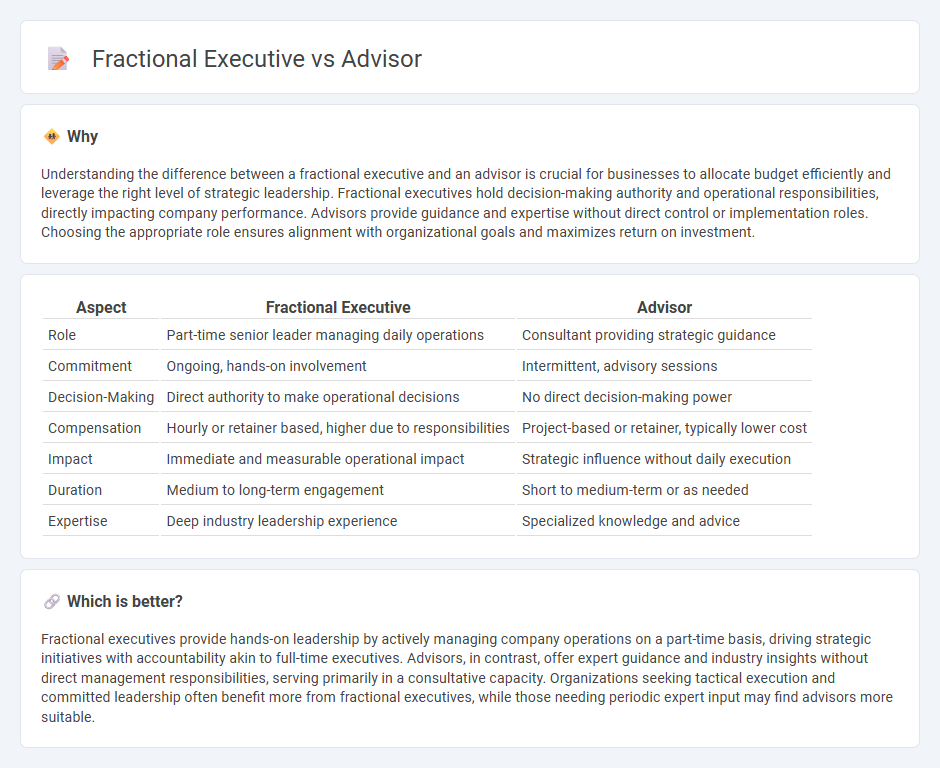
Fractional executives provide hands-on leadership within a company for a specific period, actively managing teams and driving strategic initiatives. Advisors offer expert guidance and recommendations without direct involvement in day-to-day operations, focusing on high-level decision-making support. Discover how fractional executives and advisors can uniquely impact your organization's growth and success.
Why it is important
Understanding the difference between a fractional executive and an advisor is crucial for businesses to allocate budget efficiently and leverage the right level of strategic leadership. Fractional executives hold decision-making authority and operational responsibilities, directly impacting company performance. Advisors provide guidance and expertise without direct control or implementation roles. Choosing the appropriate role ensures alignment with organizational goals and maximizes return on investment.
Comparison Table
| Aspect | Fractional Executive | Advisor |
|---|---|---|
| Role | Part-time senior leader managing daily operations | Consultant providing strategic guidance |
| Commitment | Ongoing, hands-on involvement | Intermittent, advisory sessions |
| Decision-Making | Direct authority to make operational decisions | No direct decision-making power |
| Compensation | Hourly or retainer based, higher due to responsibilities | Project-based or retainer, typically lower cost |
| Impact | Immediate and measurable operational impact | Strategic influence without daily execution |
| Duration | Medium to long-term engagement | Short to medium-term or as needed |
| Expertise | Deep industry leadership experience | Specialized knowledge and advice |
Which is better?
Fractional executives provide hands-on leadership by actively managing company operations on a part-time basis, driving strategic initiatives with accountability akin to full-time executives. Advisors, in contrast, offer expert guidance and industry insights without direct management responsibilities, serving primarily in a consultative capacity. Organizations seeking tactical execution and committed leadership often benefit more from fractional executives, while those needing periodic expert input may find advisors more suitable.
Connection
Fractional executives and advisors provide specialized expertise to organizations on a part-time or project basis, optimizing leadership and strategic guidance without the full-time employment cost. Both roles enhance corporate decision-making by delivering high-level insights tailored to specific business needs and challenges. Leveraging fractional talent allows companies to access experienced professionals flexibly, supporting growth and operational efficiency in dynamic markets.
Key Terms
Guidance
An advisor provides strategic guidance and expert recommendations tailored to specific business challenges or growth opportunities, often working on a project or retainer basis. A fractional executive, however, takes on an active leadership role within the company, making decisions and managing teams part-time while aligning strategy with execution. Explore how each role can enhance your business leadership and operational effectiveness.
Decision-making authority
Advisors provide expert guidance and recommendations without holding formal decision-making authority, supporting executives by offering insights and strategic advice. Fractional executives hold executive roles part-time, possessing decision-making authority to lead initiatives and implement strategies directly within the company. Explore the key differences between advisors and fractional executives to determine which model best fits your organizational needs.
Commitment level
An advisor typically provides strategic guidance with minimal time commitment, offering expertise on an as-needed basis without direct involvement in daily operations. A fractional executive, however, commits part-time or on a project basis, integrating closely with the company's leadership team to drive implementation and operational results. Explore the distinct commitment levels and roles to determine the best fit for your business needs.
Source and External Links
Adviser - Wikipedia - An adviser (or advisor) is a person with deep knowledge in a specific area who acts as a mentor or guide and is typically part of leadership, with the two spellings being interchangeable though with some regional preferences.
Advisor - Definition, Meaning & Synonyms - Vocabulary.com - An advisor is someone who gives advice or guidance in various fields, such as financial, career, or travel, helping others make decisions without doing the work for them.
ADVISOR | definition in the Cambridge English Dictionary - An advisor is a person who offers guidance or recommendations, often in financial or business contexts, and may work closely with clients or organizations to help make informed decisions.
 dowidth.com
dowidth.com